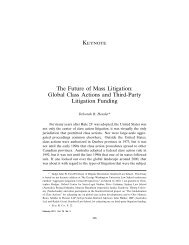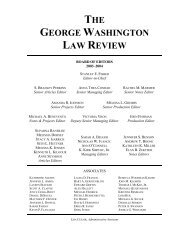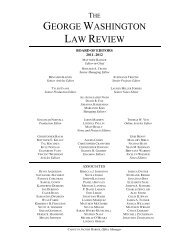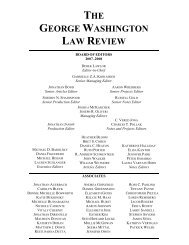View PDF - The George Washington Law Review
View PDF - The George Washington Law Review
View PDF - The George Washington Law Review
Create successful ePaper yourself
Turn your PDF publications into a flip-book with our unique Google optimized e-Paper software.
2010] Oral History and the Study of the Judiciary 869<br />
cial process is hardly a secret, Federal Judges Revealed provides valuable<br />
testimony from judges regarding how they use their clerks and<br />
how much they depend on them. We see judges outlining clerks’ roles<br />
in the preparation of judges for oral argument and decision, 112 as well<br />
as in the drafting of opinions. 113 This collection of excerpts is remarkable<br />
for its extensiveness, as well as for judges’ acknowledgements<br />
that, at least occasionally, clerk-drafted opinions are issued with no<br />
editing by the judge at all. 114 More generally, judges repeatedly emphasize<br />
the importance of clerks to their ability to do their jobs. Judge<br />
Otto Skopil opines, “[T]he importance of a law clerk has increased so<br />
tremendously in the last thirty years that it is almost unbelievable.” 115<br />
Judge James Buckley is “able to hire very able clerks, and many of<br />
them have an ability to grasp technical details and relationships that<br />
entirely escape me. Let’s face it; I try to get clerks who are significantly<br />
brighter than I am.” 116 One judge, when asked about what<br />
makes a good judge, responded “that number one is if you want to<br />
look good have some good law clerks and secondly enjoy your<br />
work.” 117<br />
Conclusion<br />
Federal Judges Revealed stands as a valuable addition to the literature<br />
on judges and judging. It provides a useful introduction to, and<br />
overview of, a previously overlooked resource for studying how a<br />
broad range of judges understand their role. Consistent with most<br />
oral history, it will best serve to supplement, rather than supplant,<br />
other modes of inquiry. <strong>The</strong> ground broken here is that of providing<br />
new perspectives on previously identified aspects of the judicial function.<br />
Moreover, oral history has its methodological limitations, and<br />
the depiction of the federal judiciary that would result from reliance<br />
on it alone is that of a limited pointillism; we have a sense of the<br />
whole, but not a firm grasp. As a consequence, the revelations that<br />
Federal Judges Revealed contains will best serve as support for and<br />
illustration of analyses and arguments grounded primarily in other<br />
methodologies. But they are valuable nonetheless, and should play a<br />
role in any appropriately eclectic account of the judicial process.<br />
112 Id. at 169–72.<br />
113 Id. at 183–91.<br />
114 Id. at 184, 186, 190–91 (quoting from the oral histories of Judges William Justice, Luther<br />
Swygert, and Milton Schwartz).<br />
115 Id. at 188 (quoting from the oral history of Judge Otto Skopil).<br />
116 Id. at 172 (quoting from the oral history of Judge James Buckley).<br />
117 Id. at 211 (quoting from the oral history of Judge Andrew Hauk).



